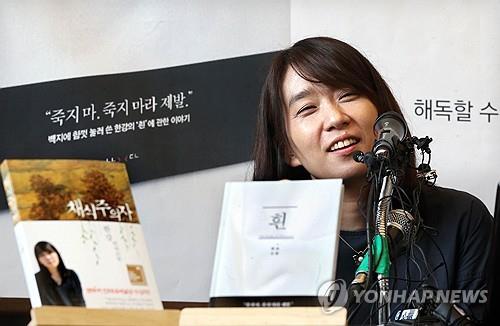- California Assembly OKs highest minimum wage in nation
- S. Korea unveils first graphic cigarette warnings
- US joins with South Korea, Japan in bid to deter North Korea
- LPGA golfer Chun In-gee finally back in action
- S. Korea won’t be top seed in final World Cup qualification round
- US men’s soccer misses 2nd straight Olympics
- US back on track in qualifying with 4-0 win over Guatemala
- High-intensity workout injuries spawn cottage industry
- CDC expands range of Zika mosquitoes into parts of Northeast
- Who knew? ‘The Walking Dead’ is helping families connect
S. Korean author Han Kang wins Nobel literature prize

This Nov. 14, 2023, file photo shows South Korean author Han Kang, the 2024 winner of the Nobel Prize in Literature. (Yonhap)
Author Han Kang won the Nobel Prize in literature Thursday, becoming the first South Korean to get the honor, a surprise feat that had her country rejoicing in disbelief and briefly paralyzed the websites of some major bookstores due to surging demand for her books.
The Swedish Academy announced Han as this year’s laureate, recognizing the 53-year-old “for her intense poetic prose that confronts historical traumas and exposes the fragility of human life.”
Han is the first Asian female winner in literature and the second South Korean Nobel laureate after former President Kim Dae-jung, who was awarded the peace prize in 2000.
“In her oeuvre, Han Kang confronts historical traumas and in each of her works exposes the fragility of human life,” the Nobel Committee said. “She has a unique awareness of the connections between body and soul, the living and the dead, and in a poetic and experimental style, has become an innovator in contemporary prose.”
Upon hearing the news, the author said she was “so surprised” and “honored” during a phone interview with the Nobel Prize committee, according to a recording of the interview on the committee’s website. She mentioned she had just finished dinner with her son, who was also quite “surprised” by the news.
“I am really honored and really appreciate your support,” she said, adding that all the books she has read since childhood have been a source of inspiration for her.
For first-time readers of her work, she recommended her most recent novel, “We Do Not Part,” as well as “Human Acts,” which she noted is closely related to the former.
Each Nobel Prize is worth 11 million Swedish crowns (US$1.1 million).
The Swedish Academy recognizes achievements in literature, science, medicine, economics and peace. The prizes were created through the will of Swedish scientist and businessman Alfred Nobel and have been awarded since 1901, with the economics prize being a later addition.
Han first shot to fame by winning the Man Booker International Prize for fiction in 2016 for “The Vegetarian.” Her Nobel Prize is expected to catapult Han further into the international spotlight.
South Koreans rejoiced over Han’s historic win Thursday evening, coming as it did as a surprise to many.
Kim Ji-hye, a 23-year-old college student, said she rushed to a bookstore in Seoul right after hearing the announcement of the winner during a live YouTube broadcast.
“I was falling asleep while watching the broadcast, but I was jolted awake by the announcement of Han Kang as the winner so I came here to buy her books,” she said. “I had been disappointed after hearing that the winner was likely to be a Chinese or Japanese author, so I’m really proud.”
President Yoon Suk Yeol offered his congratulations while in Laos for the Association of Southeast Asian Nations summit.
“It is a monumental achievement in the history of Korean literature and a national celebration that brings joy to all the people,” Yoon wrote on his Facebook page. Addressing Han, Yoon added: “You have transformed the painful wounds of our modern history into a great literary work. I extend my deepest respect to you for elevating the value of Korean literature.”
The news of Han’s win led to an immediate surge in demand for her works, including “The Vegetarian.”
South Korea’s two major online bookstores, Kyobo Book Centre and Yes24, both saw their sites crash due to heavy traffic. Han’s books occupied the real-time bestseller rankings on both sites, but they had been mostly out of stock as of Thursday night.
Han was born in 1970 in the southwestern city of Gwangju as the daughter of novelist Han Seung-won. She later moved to Seoul with her family and graduated from Yonsei University, majoring in Korean language and literature.
She began her literary career in 1993 by publishing poems in the winter issue of the quarterly “Literature and Society.” The following year, she made her debut as a novelist when her short story “Red Anchor” won a literary contest hosted by the Seoul Shinmun daily.
Han is acclaimed for creating a unique literary world that explores universal human issues, such as death and violence, through a poetic and lyrical style.
Notably, she has given fictional form to the deep darkness and wounds of modern Korean history through novels like “Human Acts” (2014), which deals with the pro-democracy people’s uprising that occurred in 1980 in Gwangju, and “We Do Not Part” (2021), which portrays the tragedy of the Jeju April 3 Incident through the perspectives of three women.
Her other notable works include “Yeosu,” “The Fruit of My Woman,” “Your Cold Hands,” “Black Deer,” “The Wind is Blowing” and “Greek Lessons.”
Previous laureates include American novelist Ernest Hemingway, English author Rudyard Kipling, Irish playwright Bernard Shaw, French writer Albert Camus and Colombian novelist Gabriel Garcia Marquez. In 2016, American singer-songwriter Bob Dylan became the first musician to win the award.
The Nobel Prize award ceremony takes place at the Stockholm Concert Hall in the Swedish capital each Dec. 10, the anniversary of Alfred Nobel’s death.











